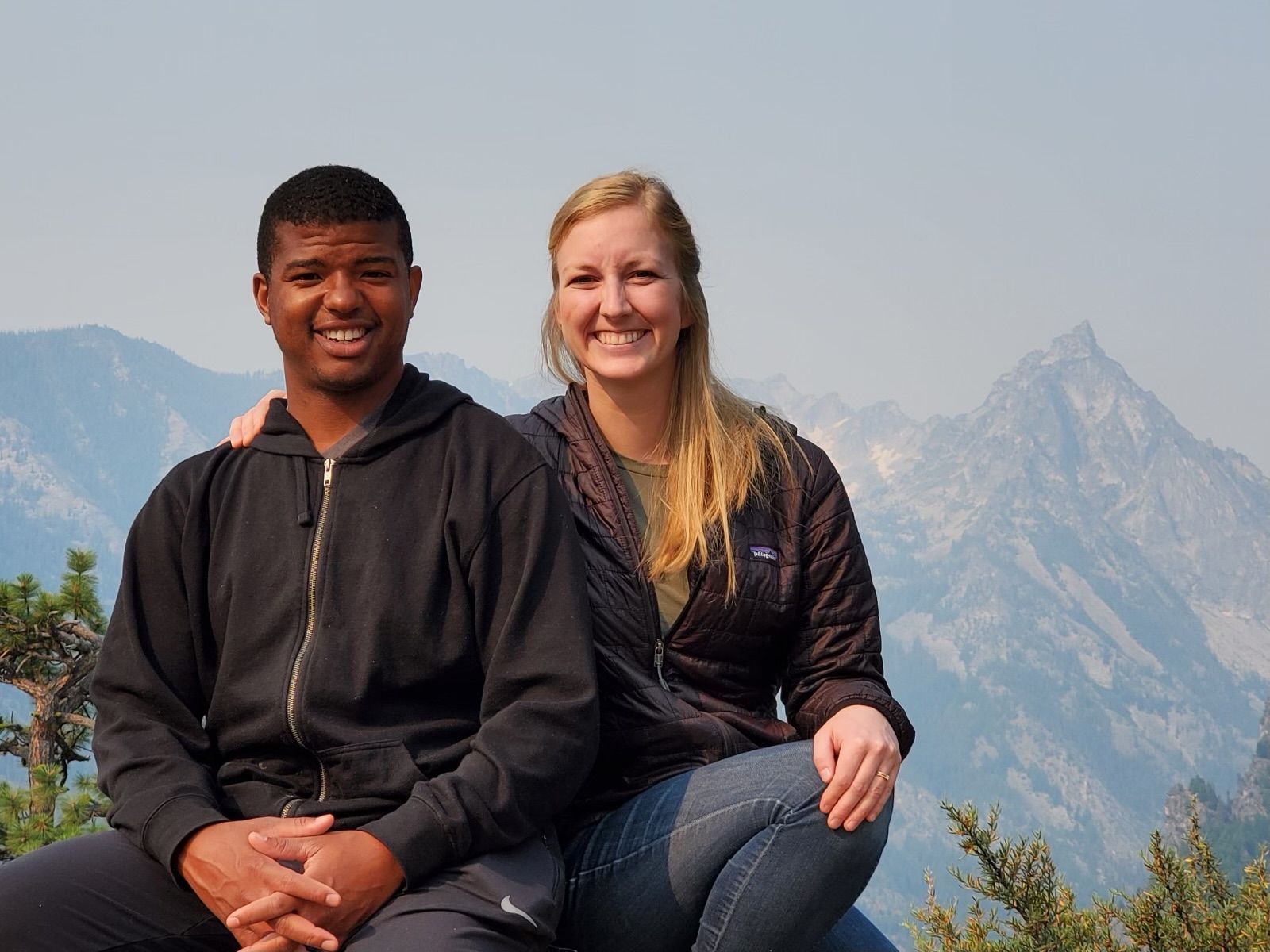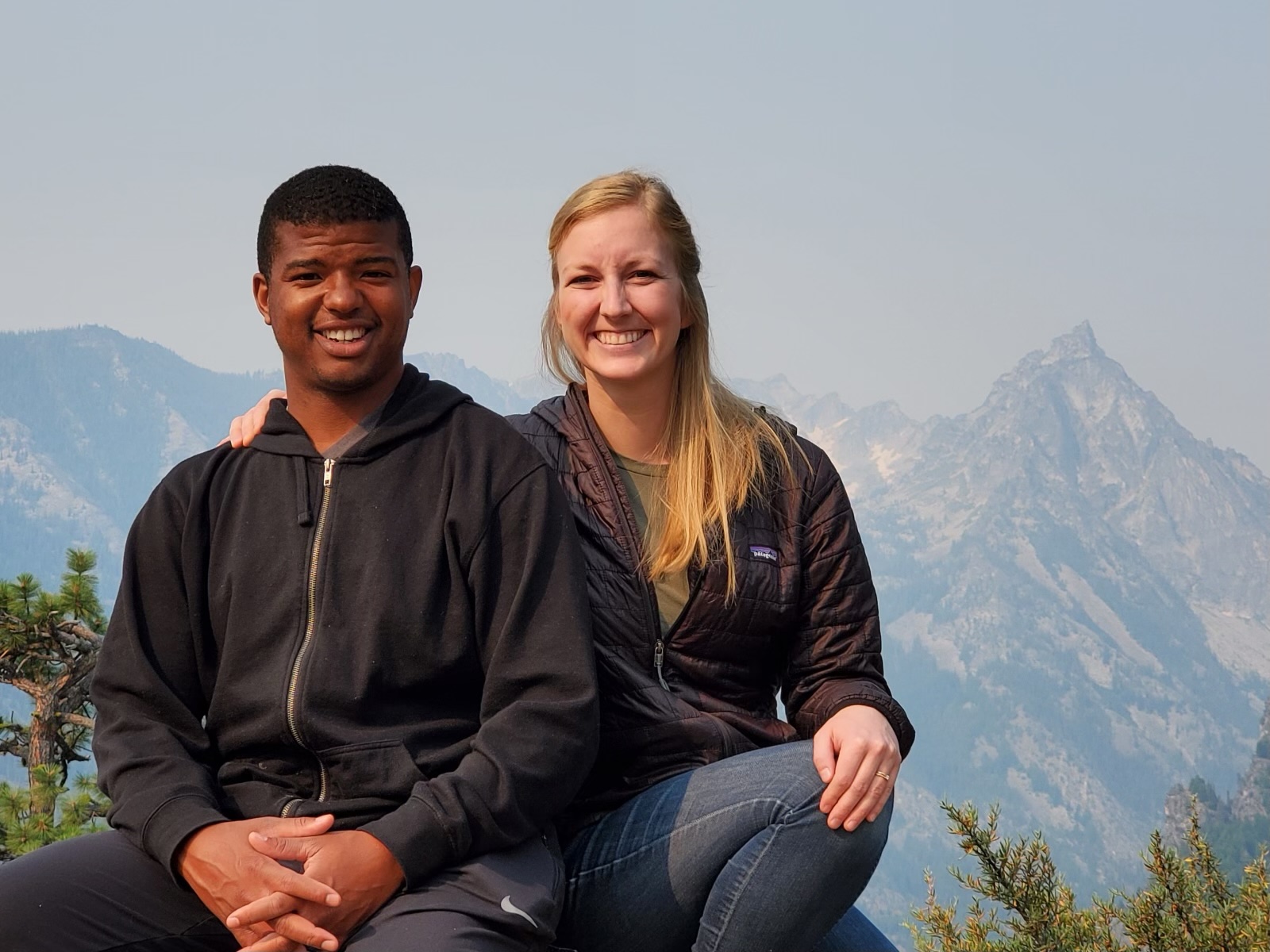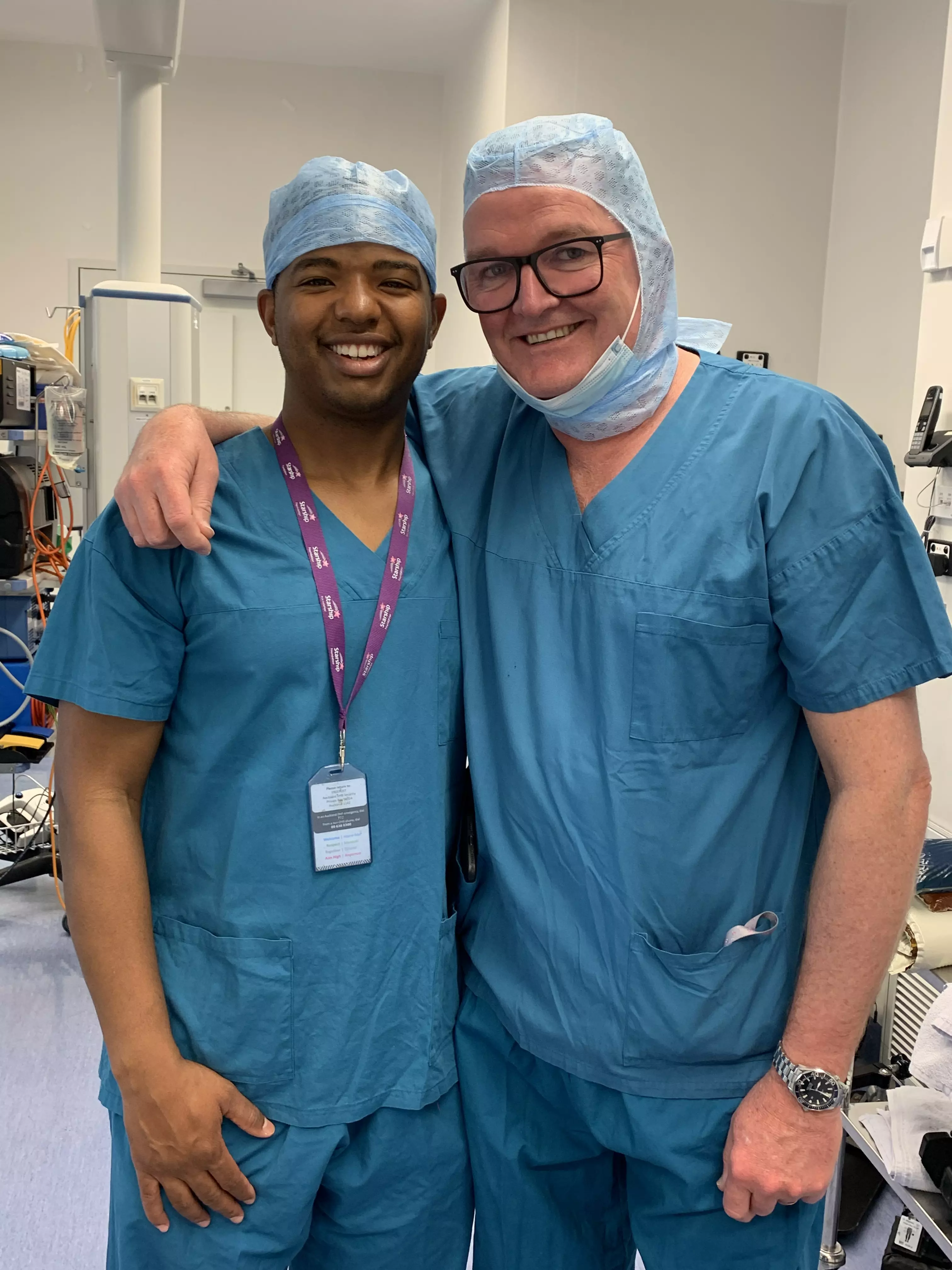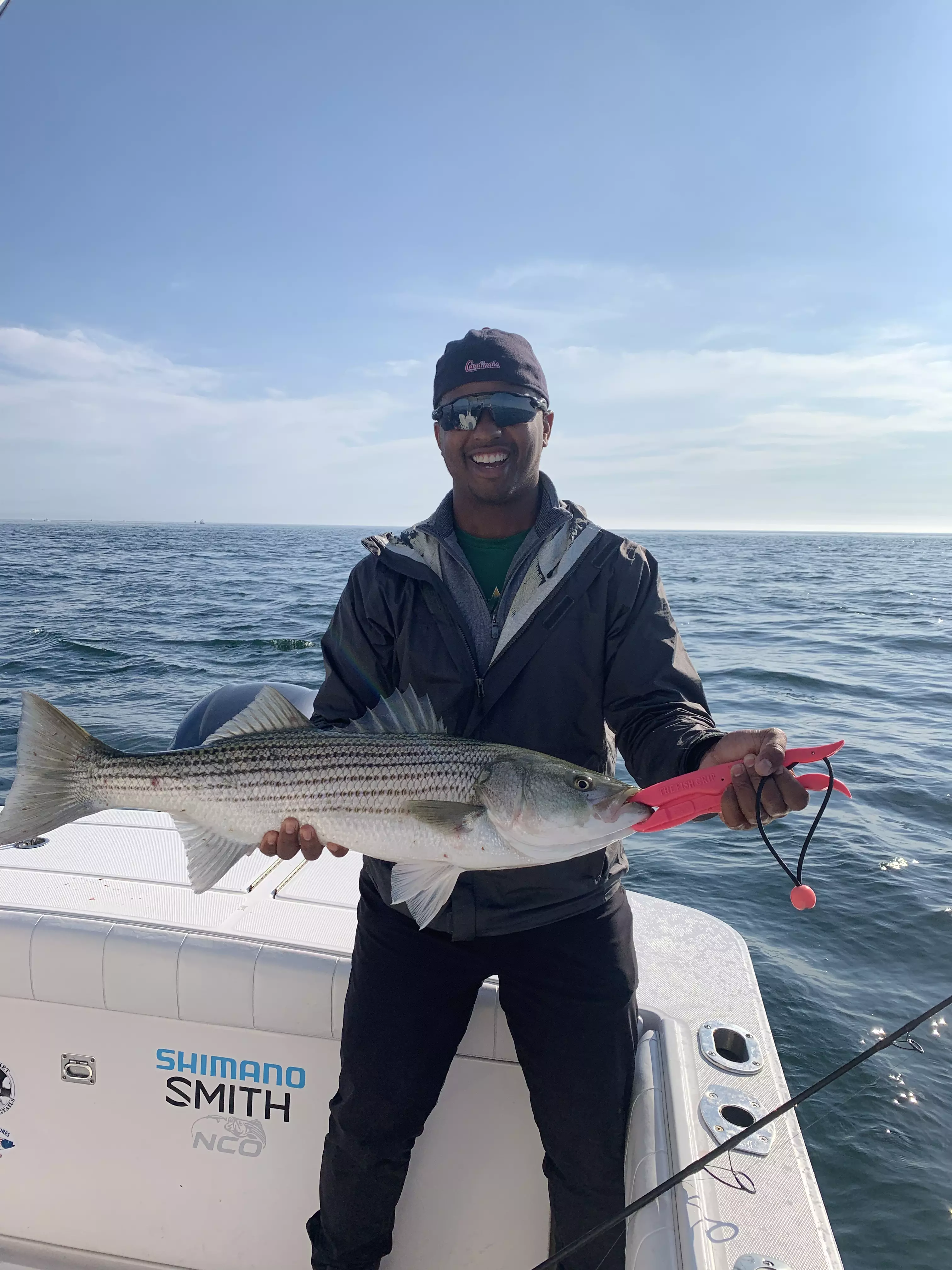August 07, 2023
Meet Blake K. Montgomery, MD
Pediatric Spine Specialist
Dr. Montgomery specializes in pediatric and adolescent orthopedic spine surgery. He has special expertise in treating spine curvatures, such as idiopathic, congenital, neuromuscular, early-onset and syndromic scoliosis, birth defects such as spina bifida, vertebral anomalies, spinal fractures, disorders of the cervical spine, skeletal dysplasia, metabolic disorders, spine tumors and disc herniations.
Where are you from? 

I was born and raised in St. Louis. There are a lot of exciting and memorable things about St. Louis for me, which is why I am eager to start my career here. My wife, Katy, and I both come from large families, so it is very nice returning to our families and hometown. We have one child and are expecting our second soon. Having a village to help raise them will be invaluable.
St. Louis has always held a special place in my heart. I have had amazing experiences growing up here. Some of my favorite memories include walking into the old Busch Stadium and immediately being welcomed by the fresh air and ballpark smell and having that feeling like I was a part of something special, especially while watching greats like Ozzie Smith. I loved spending my summer days at Six Flags, playing baseball on local teams, and fishing for bass and catfish, while spending my summer nights cooling down with Ted Drewes. I cannot tell you how many times I have been to the St. Louis Zoo and Science Center, but I can tell you it’s a lot and I learned something new every visit. I am looking forward to re-connecting with my favorite places while also creating new connections and experiences.
What made you choose pediatric spine care as a specialty?
Pediatric spine surgery is an amazing specialty, allowing the opportunity to help people in a very unique and impactful way. First, I love the wide range of ages that we are able to treat. We see infants, children, adolescents, and young adults. There are even spine conditions that are diagnosed in utero, and we are able to meet with the parents at a very early stage to start the discussion about the baby’s spine and what to expect. I find it very rewarding to be able to play with a toddler while also talking with their parents about the toddler’s spine, then go to the next room and talk with a middle school aged child and discuss their worries, followed by a room with an adolescent or young adult and have a discussion about their hopes and expectations.
I also really enjoy the variety of people we are able to help, each on their unique path with their individual goals. For example, it is rewarding to help high-level athletes to get back to their sport. It is also extremely rewarding to treat patients with highly complex medical conditions to improve their quality of life.
What brought you to Washington University Orthopedics?
Washington University School of Medicine is a world-class institution. Growing up in St. Louis, I have always had the utmost respect for Washington University. After leaving Missouri and training on the West Coast, on the East Coast, and internationally, I now understand that Washington University Orthopedics is recognized around the world for its dedication to patient care and amazing contributions to the field of orthopedic surgery.
My goal is to deliver the highest level of care to patients with a wide variety of spine surgery conditions, ranging from the relatively minor to the extremely complex. Washington University is an exceptional institution to treat complex spine conditions because it has the infrastructure, resources, and the multidisciplinary collaboration necessary to provide the highest quality of care and safety for patients. Washington University’s medical system includes the most up-to-date surgical equipment and technology in its operating rooms to allow for the safest surgery.
I also joined Washington University Orthopedics because this department is on the forefront of medicine and is a leader in the field. My goal is to continue to push the field of pediatric spine surgery forward. I aim to contribute to our understanding of pediatric spine conditions so that we can offer better care for patients in the future. Washington University is an ideal place for providers who want to make a lasting impact.
What aspect of your practice do you find most interesting or rewarding? 
One of the most rewarding parts of pediatric spine surgery is going on the journey with families. I have the opportunity to build long lasting relationships with many families as their children grow into young adults. The ultimate over-arching goal is to get the young person’s spine in the best place to serve them well for the rest of their lives. Helping patients and families understand the spine condition, seeing their relief when the diagnosis and treatments options are clearly explained, and helping them make informed decisions throughout the journey is very rewarding.
Was there a patient who made a lasting impact on you?
While many patients have made a lasting impact on me, one patient in particular was a young girl who was a high-level basketball player and loved playing sports and dancing. She had a large spinal deformity which was really starting to bother her. She tried a spine brace, but unfortunately the deformity continued to progress. She was very concerned about the curve progression, frightened about surgery, and worried about her ability to continue to play sports and dance. After multiple long discussions, she and her family and I ultimately opted for surgery. She recovered well and I will always remember how happy she was during the follow up visits because she no longer had to worry about her scoliosis, and she was able to return to doing the activities she loved.
Another patient that has made an impact on me is a young boy with a complex medical condition called mucopolysaccharidosis. He was a very engaging young boy who always had a story about how much he loved school. He was also quite the jokester in clinic which made him a fan favorite. We had been seeing him for instability in his upper neck as well as compression of his spinal cord. His condition had continued to worsen, and we recommended a surgery to help relive the compression around his spinal cord, as well as to make his neck more stable. His parents were worried about the complex nature of the surgery. After multiple discussions, the young boy and his parents decided to proceed with surgery. The surgery went well and after surgery, he immediately started joking with the staff. I will always remember the relief on the parents faces knowing that their son’s spine was now in a good position and that he was on the road to recovery. He made an excellent recovery and had many great school stories for us during his follow up visits.
Anything new on the horizon for pediatric spine care?
There are lots of new and exciting things on the horizon for pediatric spine care. One of the areas that I am really excited about is how the care of early onset scoliosis will change in the next ten years. Early onset scoliosis is scoliosis that is diagnosed before the age of 10. This form of the disease is unique because it can cause a significant trunk deformity, which can impact heart and lung development. Our current management strategies are adequate, but there are significant limitations to each of our current treatment options. There are many discussions around the world about what can be done for these patients and I am excited to be part of the team that helps improve treatment strategies for these patients.
What is the best advice you ever received? 
My late grandfather was a circuit court judge in St. Louis. He was one of the hardest working people I have ever known. He would tell me, “You do what you have to do, to do what you want to do.” This was very simple advice which always stuck with me. To me, this means to set your mind on a goal, know that it will take a lot of work, and work towards it. When I was younger and played sports, this meant I needed to practice because I wanted to perform well during the games. When I was in school, it meant I needed to study because I wanted to earn great grades. Now, this means dedicating myself to excellent patient care as I want the best possible outcomes for my patients. At each stage in life this advice continues to help guide me.
What is your favorite thing to do outside of work?
My favorite thing to do outside of work is spend time with my family. We love spending time outside and try to find activities that keep us outdoors as much as we can. I also enjoy exercising. I have ran a handful of half marathons and I have run the St. Louis Marathon. I also enjoy delicious barbecue. I am a barbecue judge and I am looking forward to re-connecting with the barbecue community.
If you weren't a physician, what would you like to be doing?
Prior to pursing medicine, I was very interested in sports, particularly baseball. I received a scholarship to play baseball in college, but injuries ended my baseball career prematurely. I love being active and helping people achieve their highest activity level. If I did not pursue medicine, then I would be involved with keeping people active in some capacity. This would most likely have been as a physical therapist helping to treat the injured.
Anything else you would like to share?
I completed a one-year complex pediatric spine fellowship in Auckland, New Zealand. Living abroad was an incredible experience, both inside and outside of the hospital. From learning about Māori culture, to exploring some of the most beautiful nature and wildlife in the world, to making lasting friendships, it was an experience I will always cherish. My wife and I look forward to taking our kids there someday.
Learn why patient's choose Washington University Orthopedics, request an appointment online or call (314) 514-3500.